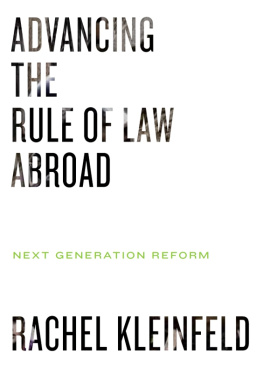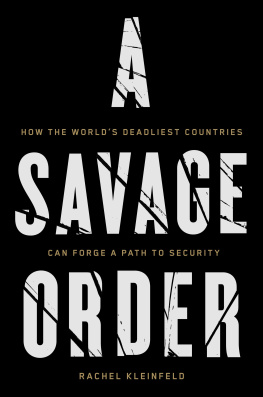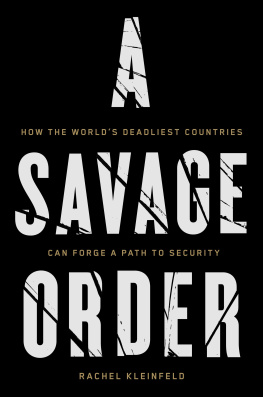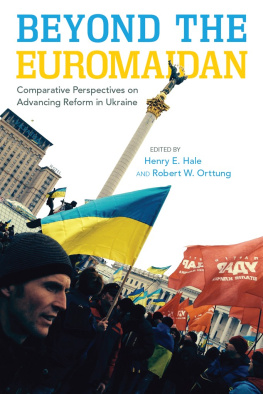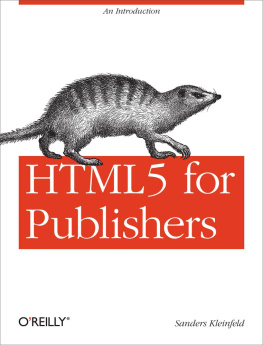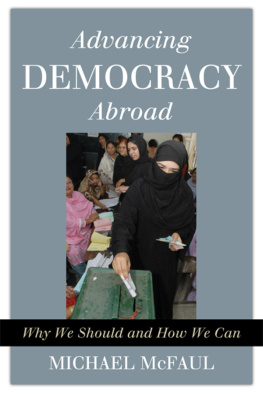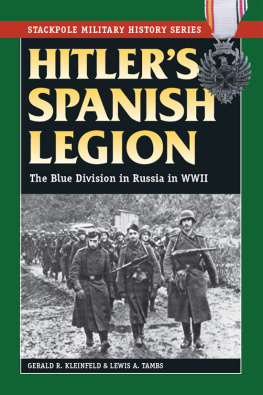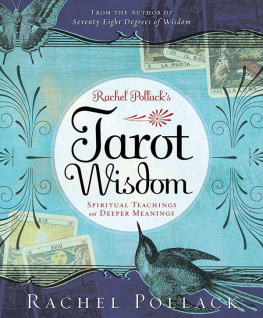

2012 Carnegie Endowment for International Peace. All rights reserved.
No part of this publication may be reproduced or transmitted in any form or by any means without written permission from the Carnegie Endowment.
Carnegie Endowment for International Peace
1779 Massachusetts Avenue, N.W.
Washington, D.C. 20036
202-483-7600, Fax 202-483-1840
www.ceip.org
The Carnegie Endowment does not take institutional positions on public policy issues; the views represented here are the authors own and do not necessarily reflect the views of the Endowment, its staff, or its trustees.
To order, contact:
Hopkins Fulfillment Service
P.O. Box 50370, Baltimore, MD 21211-4370
1-800-537-5487 or 1-410-516-6956
Fax 1-410-516-6998
Cover design by Jocelyn Soly
Library of Congress Cataloging-in-Publication Data
Kleinfeld, Rachel.
Advancing the rule of law abroad : next generation reform / Rachel Kleinfeld.
p. cm.
ISBN 978-0-87003-348-3 (pbk.)ISBN 978-0-87003-349-0 (cloth)ISBN 978-0-87003-266-0 (e-book) 1. Law reform. 2. New democracies. 3. Rule of law. 4. LawAmerican influences.
5. LawEuropean influences. I. Title.
K559.K59 2012
340.11dc23
2012001516
Contents
This book owes its existence to Tom Carothers, who well over a decade ago began to support my journey in the rule-of-law field. His insight, wisdom, and willingness to put up with an extremely long writing process have allowed these words to finally see the light of day. I also owe great thanks to the Carnegie Endowment for International Peace, particularly Ilonka Oszvald and Jocelyn Soly, who painstakingly worked through the copyediting and cover design of this book.
The seeds of this writing began a decade ago at Oxford University. I owe immense thanks to the trust of Kalypso Nicolaidis, my adviser who not only oversaw my doctoral thesis in this area, but believed that I still might finish despite my decision to move back to America and start a nonprofit organization a year into the writing. Her patience, good-humor, and intellectual partnership have been a gift.
My thinking in the rule-of-law field has been spurred by many great intellects and practitioners. From my earliest days I have been influenced by my fathers fierce intelligence and his life-long service to the law, which provided inspirationand fodder for decades of dinner-table debates. I also thank both my father and mother for their libertarianism, which allowed me to spend youthful years gallivanting through countries that lacked much rule of lawexperiences for which I will thank them for the rest of my life. Two who deserve special mention are Richard Messick of the World Bank and Wade Channell from USAID. Their willingness to read early versions of the manuscript and provide feedback has strengthened the work, and I have learned a great deal from their own writings and our manifold conversations over the years.
I have also enjoyed talking through these issues with many members of the Truman National Security Project community, from those working on the ground in Afghanistan and Iraq, to those in the trenches at the U.S. Department of State, Department of Defense, National Security Council, and other government agencies. Since the Truman community always engages in lively debate, I will not name names of those who might disagree with these conclusionsbut I deeply appreciate all of their thoughts, grounded insights, and targeted questions. Their work in some of the most dangerous parts of the worldand some of the toughest parts of Washington, D.C.! inspires and humbles my own efforts.
The research for this book drew on scores of interviews in countries around the world. I thank all those who provided their time to answer my many questions. Their names appear throughout the notes, but some who offered deeper insight (and second and third interviews) demand particular mention, such as Sebastian Pompe in Indonesia, Aurel Ciobanu-Dordea in Romania, and Fatos Bundo in Albania. While in most countries I worked without a translator, in Indonesia, John Riady provided that serviceas well as handling all logistics, setting up meetings, and swiftly becoming a fellow thinker and colleague. Ive rarely met such a fast learner or such a skilled compatriot at the art of getting things done while stuck in the midst of Jakarta traffic! I am grateful for his help, savvy, and intelligence.
This book owes its existence to experiences I had in rural India, Russia, and Eastern Europe, where the fabric of rule-of-law societies had frayed. These experiences sent me on a nearly twenty-year journey to discover how to improve the security, enhance the development, and increase the empowerment and human rights of people around the world who struggle under societies without liberty under law. It is easy to write about these issues; it is hard to fight them from the ground up. This book is dedicated to all those working for justice and dignity under the rule of lawmay their struggle be rewarded, and may the United States stand on their side.
When one speaks to an audience in a country moving away from authoritarian rule about possible paths ahead, the surest way to elicit wide agreement and interest is to highlight the importance of the rule of law. Whereas references to democracy or market economics will provoke a debate about their value and appropriateness for the society in question, the rule of law commands near-universal respect. Different audience members may understand the term in different wayssome will hear anticorruption, others the need for basic personal security, and still others will interpret it as a broad but powerful quest for justicebut they will not question the importance of the basic enterprise.
In parallel fashion, although Western policymakers and aid practitioners trying to assist postauthoritarian transitions often squabble over models and sequences of political and economic development, they are almost always unanimous in agreeing that rule-of-law development should be a priority. As I wrote in the 1990s, when the international community was starting to support political and economic transitions in every corner of the world, the rule of law has come to be seen as the elixir of transitions. That is to say, it is perceived as a necessary foundation for the success of all other elements of the transitional packagepolitical, social, economic, and humanitarian.
The result has been a mushrooming of efforts to foster the rule of law in a remarkably large and diverse group of countries. Throughout the developing and postcommunist worlds, one finds a welter of specific undertakings advanced under the rubric of rule-of-law development. These include attempts to promote transitional justice, judicial and police reform, legal aid, access to justice, alternative dispute resolution, legal education, and much else.
Unquestionably many of these efforts are valuable and have produced positive effects. But the experience has often been daunting. Russia has attempted myriad rule-of-law reforms for twenty years and absorbed significant amounts of Western assistance in the effort, yet law in Russia remains associated as much with the abuse of power as the regulation of it. El Salvador has been an early and continuing recipient of substantial amounts of rule-of-law assistance from abroad, but is beset today with devastating levels of criminality. Nearly two decades of varied attempts to help Cambodia with transitional justice and basic legal reforms have produced only very modest results.



